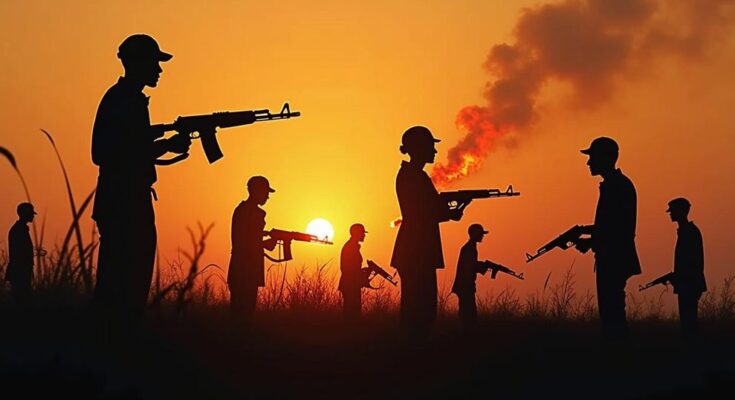The U.S. and UAE expressed shared concern over Sudan’s crisis, yet the UAE supports the RSF, a group responsible for mass atrocities. Reports cast doubt on the UAE’s humanitarian claims as millions face displacement and famine. President Biden’s call for an end to arms supplies raises critical questions about U.S. foreign policy consistency in addressing the conflict and its humanitarian implications.
On September 23, the White House issued a statement following a bilateral meeting between President Biden and Sheikh Mohamed bin Zayed Al Nahyan, the President of the United Arab Emirates (UAE). This detailed document highlighted the strong partnership between the U.S. and the UAE, expressing mutual concerns regarding the escalating crisis in Sudan. The statement specifically asserted that there could be no military resolution to the conflict and called for accountability regarding war crimes. However, this stance appears contradictory considering the UAE’s support for the Rapid Support Forces (RSF), a group notorious for committing grave atrocities, including sexual violence and ethnic cleansing. The RSF, which operates more like a criminal entity than a legitimate political force, continues its violent campaign in Darfur, exacerbating the humanitarian crisis despite calls for restraint from entities such as the African Union and the United Nations. The situation is further complicated by reports, notably from the New York Times on September 21, which reveal that the UAE’s support for the RSF involves not only weaponry and financial aid but also a disingenuous portrayal of humanitarian assistance. The UAE allegedly masks its complicity in malign actions under the guise of aiding the Sudanese populace, effectively undermining the integrity of humanitarian organizations like the Red Cross. As a consequence, approximately twelve million individuals are displaced, with the threat of famine looming large over millions more. These developments pose significant questions regarding the United States’ involvement in the UAE’s dubious narrative. President Biden’s subsequent remarks at the United Nations General Assembly on September 24, urging the cessation of arms supplies to conflict-waging generals and promoting humanitarian access, articulated a clear stance against the ongoing violence. Nonetheless, the alignment with the UAE’s dubious humanitarian claims raises concerns about the sincerity and effectiveness of the U.S. position on the Sudanese crisis. The juxtaposition of the administration’s declarations lends a disheartening complexity to its commitment towards genuine peace in Sudan, leading one to ponder whether such statements are merely performative. There exists an urgent need for the U.S. to reconcile its strategic partnerships with ethical imperatives. The accountability for actions taken in Sudan must be unequivocal, both for those directly involved in the conflict and for external partners that perpetuate violence under the facade of humanitarian aid. Ultimately, without transparency and alignment between the U.S. rhetoric and actions on the ground, the credibility of American diplomacy in Sudan and the wider region risks undermining genuine efforts for peace and stability.
The conflict in Sudan has intensified dramatically, particularly with the involvement of the Rapid Support Forces (RSF), a group known for its violent tactics and disregard for human rights. Despite ongoing pleas for peace from international organizations, the RSF has continued its offensive in key areas like Darfur. Concurrently, the United Arab Emirates has been accused of providing covert support to the RSF while publicly positioning itself as a humanitarian ally. This duality creates a complex web of international relations that influences the humanitarian situation in Sudan, raising essential questions about U.S. foreign policy and alliances in the Middle East.
In summary, Washington’s response to the war in Sudan reflects a troubling paradox, where high-level diplomatic language suggests a commitment to peace, while the actions of its allies, particularly the UAE’s support for the RSF, undermine those very principles. This divergence calls for a reevaluation of U.S. foreign policy to ensure it aligns with the realities on the ground. The urgent humanitarian crisis in Sudan demands comprehensive action that prioritizes the welfare of civilians over diplomatic niceties.
Original Source: www.cfr.org




